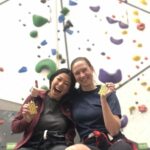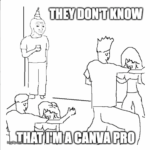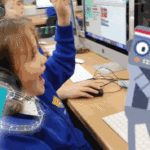Hello, and welcome to my second weekly reflection of this semester! For this week’s reflection, I will talk about the Most Likely To Succeed film that we watched for our Technology and Innovation in Education class!
The Most Likely To Succeed documentary explored the conventional and traditional methods of teaching that are being used in the United States. It also questioned whether these methods are truly preparing students for the current world we live in. This film highlighted a school in San Diego called High Tech High, where teachers, students and parents were involved in a whole new way of teaching and learning. High Tech High may just be a start towards a whole new approach to education – one that celebrates skills at an individual level and that allows flexibility in different learning styles. In my opinion, this type of learning environment is incredibly valuable, as students with a variety of learning styles are able to learn and understand concepts in a way that works for them.
So what is High Tech High? High Tech High is a school where students are given opportunities to learn concepts that “normal schools” are learning, but in a way that allows for them to explore it in a meaningful, individualized way. Teachers step back from the standard teacher-at-front-of-room method and in return, students are handed more responsibility for their learning. Most of their learning occurs in discussion and project form, which allows for high amounts of collaboration, problem solving and team work. The students also work on these projects to showcase to the community at the end of the year, which gives them a natural sense of motivation. This student centred method of education allows for an environment of learners who are passionate, motivated and accountable. They have the support of the teachers and staff around them, but giving the students full rein over their project allows them to also be accountable for their own actions. It’s a method of learning through trial and error, which I believe is so incredibly important as the biggest lessons are learnt through mistakes.
Traditionally, students go to class, memorize concepts and then take tests to be assessed of their “understanding” of the concepts. But this primarily measured whether a student could successfully memorize the concepts or not. This may have worked when the education system was developed during the industrial age, but nowadays, when students are out of school, creative and innovative minds is what will propel them forward in our ever progressing economy.
I found this film incredibly interesting – not only because of what the students and teachers did, but because I relate to alternative methods of education. I also believe that the education curriculum must be adjusted to meet the needs of learners of todays world, and I think this film is a good indicator of what students are truly learning in schools today. High Tech High’s innovative, project-based approach appealed to me as I think students who work on a project as hard as those students did for a specific length of time will not likely forget that project. To also achieve an end product that some of those students were able to do would require high levels of understanding of the topic.
I really enjoyed seeing how teachers handled students who didn’t finish their projects in time for the exhibition date – there were no poor marks, but rather an engaging group conversation that allowed for the student to understand where things may have gone wrong and what they can improve on for next time. I think this allowed the student to truly understand what decisions to make and not make, and learnt that teamwork is beneficial in big projects intended for a group of students to collaborate on together.
From this film, my main takeaway is that when I am teaching, I don’t want the concepts that I teach to be something people memorize and then forget. Current education methods are creating conditions for memorization and test passing, but what we really want are students who are full of understanding of many different aspects of life, and to be able to apply it to the world. I hope that my future teaching provides them with the ability to experience real life situations such as collaboration and group work, so that they are prepared to enter and tackle an innovative era.





